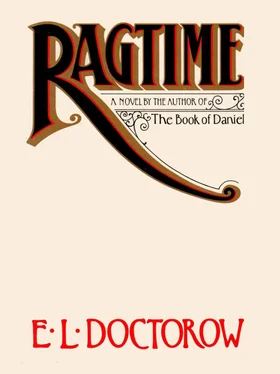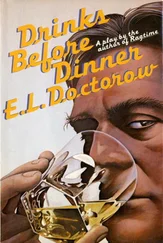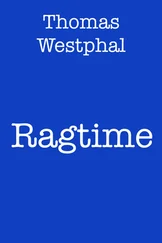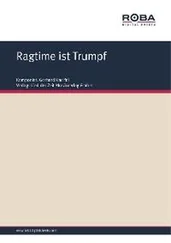Edgar Doctorow - Ragtime
Здесь есть возможность читать онлайн «Edgar Doctorow - Ragtime» весь текст электронной книги совершенно бесплатно (целиком полную версию без сокращений). В некоторых случаях можно слушать аудио, скачать через торрент в формате fb2 и присутствует краткое содержание. Жанр: Современная проза, на английском языке. Описание произведения, (предисловие) а так же отзывы посетителей доступны на портале библиотеки ЛибКат.
- Название:Ragtime
- Автор:
- Жанр:
- Год:неизвестен
- ISBN:нет данных
- Рейтинг книги:4 / 5. Голосов: 1
-
Избранное:Добавить в избранное
- Отзывы:
-
Ваша оценка:
- 80
- 1
- 2
- 3
- 4
- 5
Ragtime: краткое содержание, описание и аннотация
Предлагаем к чтению аннотацию, описание, краткое содержание или предисловие (зависит от того, что написал сам автор книги «Ragtime»). Если вы не нашли необходимую информацию о книге — напишите в комментариях, мы постараемся отыскать её.
Ragtime — читать онлайн бесплатно полную книгу (весь текст) целиком
Ниже представлен текст книги, разбитый по страницам. Система сохранения места последней прочитанной страницы, позволяет с удобством читать онлайн бесплатно книгу «Ragtime», без необходимости каждый раз заново искать на чём Вы остановились. Поставьте закладку, и сможете в любой момент перейти на страницу, на которой закончили чтение.
Интервал:
Закладка:
At this point everyone’s most urgent need was to know what Coalhouse Walker looked like. The newspapers competed fiercely. Newsmen stormed the offices of the Clef Club Orchestra in Harlem. There were no pictures to be had that included the face of the infamous pianist. Hearst’s American triumphantly went to press with a portrait of the composer Scott Joplin. Friends of Joplin threatened to sue, the composer being in the last stages of a terminal illness and unable to see to his own interests. Apologies were tendered. Finally a newspaper in St. Louis came up with a picture that was reprinted widely. Father recognized it to be accurate. It showed a somewhat younger Coalhouse sitting at an upright piano in white tie and tails. His hands were on the keyboard and he was smiling for the camera. Grouped around the piano were a banjo player, a cornetist, a trombonist, a violinist and a drummer bent over a snare drum. They were all in white tie. They were posed as if playing but were clearly not. A circle was drawn around Coalhouse’s head. This became the standard photo. The ironies of a smiling black man with a neat moustache, an altogether cheerful and forthright physiognomy, were too delicious for the caption writers to resist. Smile of a killer, they said. Or the President of the Provisional American Government in happier days.
Under the intense and widespread investigation by the press the family’s role in the entire affair could not be kept hidden. Reporters, first in ones and twos, later in larger groups, began to knock on the door, and then, being refused admittance, to camp outside under the Norwegian maples. They wanted to see the brown child, they wanted statements of any kind about Coalhouse and his visits to Sarah. They peeked through the windows of the parlor and came around to the kitchen door to try the lock. They wore straw boaters and carried pads in their pockets. They chewed tobacco and spit it on the ground and crushed cigarettes under their heels in the grass. Pictures of the house appeared in the New York papers. There were inaccurate accounts of Father’s explorations. The blinds were drawn and the boy was not allowed to go out. The house was stifling and in the night Grandfather moaned in his sleep.
Mother might have withstood all of this if a debate did not rise concerning the family sheltering of Coalhouse Walker’s son. S steady parade of cars came up the hill in the long evenings as sightseers craned their necks for a glimpse of a face in the window. An official of the Child Welfare Board in New York gave an opinion that the still-unchristened illegitimate child should be given over to one of the excellent asylums that existed for the care of orphans, waifs and children born out of wedlock. Mother kept the baby in her room. She would no longer take him downstairs. She enlisted her son to watch over him when she had to see to something. She did not take the time to put her hair up but let it hang to her shoulders all day. She was uncharacteristic in her bitterness toward Father. Why don’t you unlock your treasure chest, she said and get me some proper help. This was a reference to his financial conservatism which she had never before questioned. Always they had lived less well than he could afford. Father was stung by the remark but he went out and found a woman to do the cooking and another woman to be laundress and housemaid, both to live in. He hired the man who had been the part-time gardener and installed him in the rooms above the garage stable. Grandfather already had a registered nurse to tend him in the day. The house, under siege, now bustled like a wartime camp. The boy was constantly admonished to get out from under people’s feet. He watched his mother pace her room, her hands clasped in front of her, her unbound hair hanging down the sides of her face. She looked gaunt, and her chain, which had always inclined to roundness, seemed ungenerous, even pointed.
It was clear the crisis was driving the spirit from their lives. Father had always felt secretly that as a family they were touched by an extra light. He felt it going now. He felt stupid and plodding, available simply to have done to him what circumstances would do. Coalhouse ruled. Yet he had been to the Artic, to Africa, to the Philippines. He had traveled out west. Did that mean only that more and more of the world resisted his intelligence? He sat in his study. Everyone he thought about, even Grandfather, he saw in terms of his own failed concern. He had treated Grandfather with the arrogant courtesy one gives the senile even before the condition has set in. From Younger Brother he was completely estranged. Toward his wife he felt drastically slipped in her estimation, an explorer in body only, the spirit trapped in his own father’s prejudices. He was beginning to look like him, too, going dry and juiceless in everything, with a mad glint showing in the corner of his eye. Why did that have to be?
He condemned himself most for the neglect of his son. He never talked to the boy or offered his companionship. He had always relied on his presence in the child’s life as a model for emulation. How smug that was, how stupid, as the tactic of a man who had acted in his life to distinguish himself from his own father. He looked for the boy and found him on the floor of his room reading in the evening paper an account of the successful play of the New York baseball nine under the masterful coaching of John J. McGraw. Would you like to see that team? he said. The boy looked up, startled. I was just thinking of it, he said. Father went to Mother’s room. Tomorrow, he announced, I am taking the boy to see a game of baseball. He said this with such resolve in its rightness that she was checked in her response, which was to condemn him for an idiot, and when he left the room she could only wonder that she had had that thought in the first place, so separated from my feeling of love.
30
The next afternoon, when father and son left the house, two reporters followed them part of the way on their brisk walk to the railroad station on Quaker Ridge Road. We’re going to the Giants baseball game, Father advised them. That’s all I will say. Who’s pitching? one of the reporters asked. Rube Marquard, the boy said. He’s won his last three chances.
Just as they reached Quaker Ridge a train pulled in. This was the New York Westchester and Boston railway. It did not go anywhere near Boston, nor did it provide service all the way to New York. But it gave a smooth ride to the Bronx and left them with a trolley connection, the 155th Street crosstown, which went over the Harlem River to the Polo Grounds at Coogan’s Bluff.
It was a fine afternoon. Large white clouds moved briskly under a clear blue sky. As the trolley came across the bridge they could see on the bluff overlooking the wooden stands several huge trees which, lacking leaves even in this season, supported derbied figures of men who preferred not to pay to enter the park but to watch the game festooned in the branches like black flowers swaying in the wind. Father caught some of the boy’s excitement. He was immensely pleased to be out of New Rochelle. When they reached the park crowds were streaming down e stairs from the El, cabs were pulling up and discharging their passengers, newsboys were hawking programs of the game, and there was a raucous energy everywhere in the street. Horns blew. The overhead tracks of the El left the street mottled with sun. Father bought the expensive fifty-cent admission, then paid extra for a box, and they entered the park and took their seats behind first base in the lower of the two decks where the sun would for an inning or two cause them to shade their eyes.
The Giants were dressed in their baggy white uniforms with black pin stripes. The manager, McGraw, wore a heavy black cardigan over his barreled trunk with the letters NY emblazoned on the left sleeve. He was short and pugnacious. Like his team he wore socks with thick horizontal stripes and the small flat cap with a peak and a button on the crown. The opponents of the afternoon were the Boston Braves, whose dark blue flannels were buttoned to the neck with the collar turned up. A brisk wind blew the dirt of the field. The game began and almost immediately Father regretted the seats he had chosen. The players’ every ragging curse could be heard clearly by his son. The team at bat shouted obscene taunts at the opposing pitcher. McGraw himself, the paternal figure and commander of his team, stood at third base unleashing the most constant and creative string of vile epithets of anyone. His strident caw could be heard throughout the park. The crowd seemed to match him in its passions. The game was close, with first one team then the other assuming the lead. A runner sliding into second base upended the Giant second baseman, who rose howling, limping in circles and bleeding profusely through his stocking. Both teams came running from their dugouts and the game was stopped for some minutes while everyone fought and rolled in the dirt and the crowd yelled its encouragement. An inning or two after the fight the Giant pitcher Marquard seemed to lose his control and threw the ball so that it hit the Boston batsman. This fellow rose from the ground and ran out toward Marquard waving his bat. Again the dugouts emptied and players wrestled with each other and threw their roundhouse punches and beat clouds of dust into the air. The audience this time participated by throwing soda pop bottles onto the field. Father consulted his program. On the Giant side were Merkle, Doyle, Meyers, Snodgrass and Herzog, among others. The Boston team boasted a player named Rabbit Maranville, a shortstop who he noted roamed his position bent over with his hands at the end of his long arms grazing the grass in a manner that would more properly be called simian. There was a first baseman named Butch Schmidt, and others with the names Cocrehan, Moran, Hess, Rudolph, which led inevitably to the conclusion that professional baseball was played by immigrants. When play was resumed he studied each batsman: indeed, they seemed to be clearly from the mills and farms, rude-features, jug-eared men, sunburned and ham-handed, cheek bulging with tobacco chew, their intelligence completely absorbed in the effort of the game. The players in the field wore outsized flapping leather gloves which made them look like half-dressed clowns. The dry dust of the diamond was blotched with expectorant. Woe to the campaigns of the Anti-Spitting League in the example of these men. On the Boston side the boy who picked up the bats and replaced them in the dugout was, upon second look, a midget, in a team uniform like the rest but proportionately minute. His shouts and taunts were piped in soprano. Most of the players who came to bat first touched him on the head, a gesture he seemed to invite, so that Father realized it was a kind of good luck ritual. On the Giant side was no midget but a strange skinny man whose uniform was ill-fitting, who had weak eyes that did not align properly and who seemed to shadow the game in a lethargic pantomime of his own solitude, pitching imaginary balls more or less in tie to the real pitches. He looked like a dirt eater. He waved is arm in complete circles, like a windmill turns. Father began to watch the game less than he did this unfortunate creature, obviously a team pet, like the Boston midget. During dull moments of the game the crowd yelled to him and applauded his antics. Sure enough, he was listed in the program as mascot. His name was Charles Victor Faust. He was clearly a fool who, for imagining himself one of the players, was kept on the team roster for their amusement.
Читать дальшеИнтервал:
Закладка:
Похожие книги на «Ragtime»
Представляем Вашему вниманию похожие книги на «Ragtime» списком для выбора. Мы отобрали схожую по названию и смыслу литературу в надежде предоставить читателям больше вариантов отыскать новые, интересные, ещё непрочитанные произведения.
Обсуждение, отзывы о книге «Ragtime» и просто собственные мнения читателей. Оставьте ваши комментарии, напишите, что Вы думаете о произведении, его смысле или главных героях. Укажите что конкретно понравилось, а что нет, и почему Вы так считаете.












